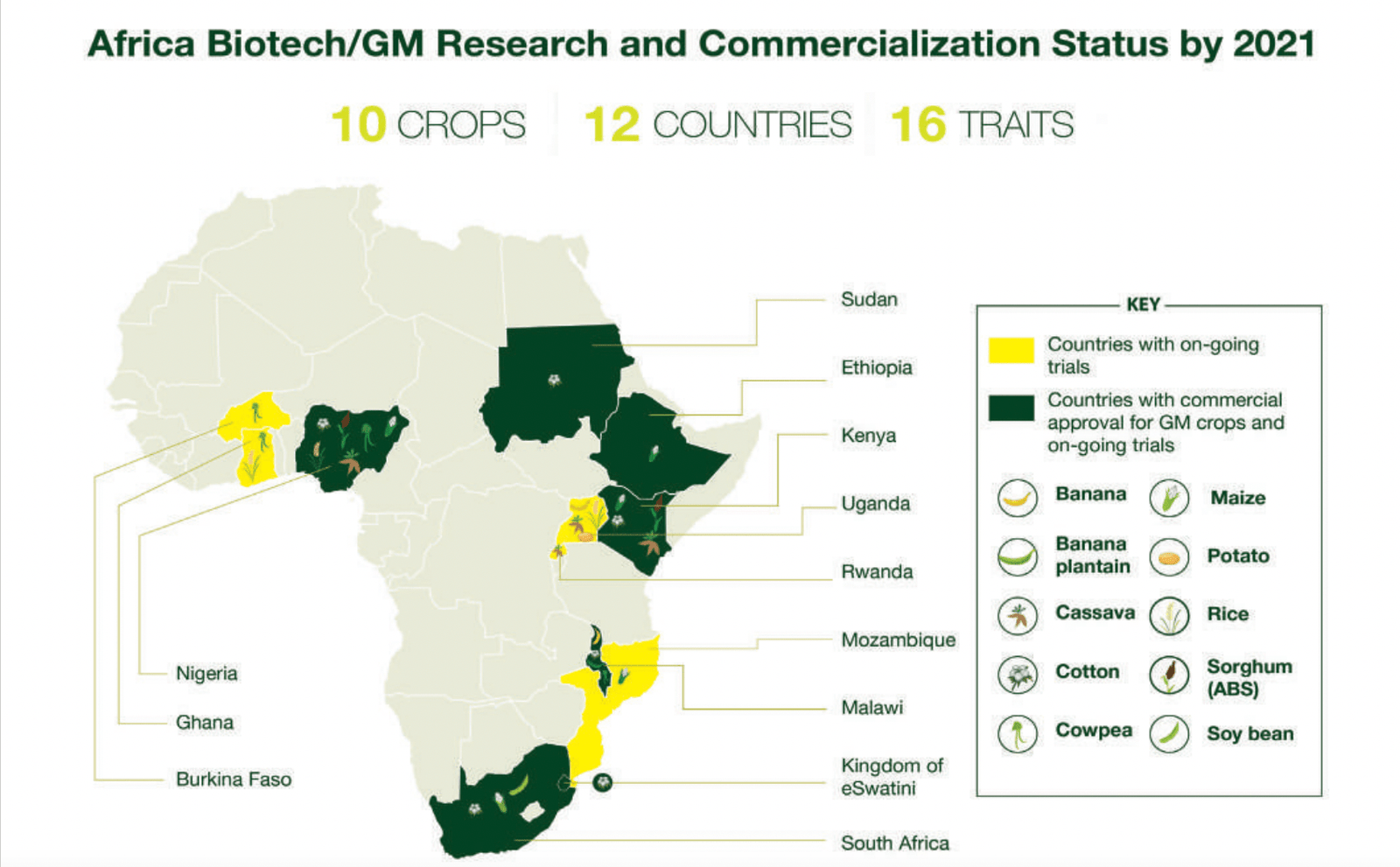By Dr Margaret Karembu, MBS
Biotech crops promise to make agriculture competitive in Africa
And as the continent’s agriculture sector strives to meet the growing food demand in the face of a swelling population, the intractable challenge of climate change has become a major concern. Africa has borne the heaviest brunt of persistent drought, new pests and crop diseases,
threatening its agricultural production and food security. According to Relief Web, a humanitarian information source, one in five people in Africa face hunger with climatic variability being one of the major contributors to this situation.
Besides worsening the food security state, harsh climatic conditions pose a danger to national economies owing to agriculture’s competitiveness in generating jobs for millions of youth and women.
Biotechnology offers one of the viable tools required to address these challenges. Climate-smart biotech crops present an option in combating food insecurity and creating job opportunities on the continent.
Important milestones
The recognition of this technology’s huge potential has seen global adoption of biotech crops increased 112-fold since 1996 when the first biotech crop was commercialised.
“By 2020, the accumulated biotech area was 2.7 billion hectares (6.7 billion acres), making biotechnology the fastest adopted crop technology in the world,” says a report by the International Service for the Acquisition of Agribiotech Applications (ISAAA).

Africa has made remarkable progress as well, with the number of countries planting biotech crops more than doubling from three in 2018 to seven in 2021. These countries are Kenya, Ethiopia, Malawi, Nigeria, South Africa, Sudan and Eswatini. The seven countries grew three biotech crops – maize, soybean and cotton – on approximately three million hectares in 2021.
Bt cowpea is the latest entrant on the list of commercialised biotech crops in Africa.
Over the last one year alone, Africa has recorded two milestones in agricultural biotechnology – environmental release approval of two food crops – disease-resistant cassava in Kenya, and TELA maize in Nigeria.
This significant advancement has positioned the continent for increased adoption.
Economic gains
African farmers continue to reap significant agronomic, environmental and socio-economic gains from biotech crops.
“Estimated economic gains from biotech crops for South Africa for the period 1998 to 2018 was approximately US$2 billion and US$237 million for 2018 alone,” says the ISAAA report.
Sudan has experienced positive change in the entire cotton sub-sector value chain thanks to the country’s full adoption of insect-resistant Bt cotton, which has seen a three-fold increase in yields.
“Other significant benefits will arise from the introduction of ginneries and cottonseed oil extraction factories.
There are also prospects for exporting seeds, spinning, and textile production in neighbouring countries,” ISAAA Report In Eswatini, farmers reported a reduction of chemical sprays from eight to just three per cropping season – a significant benefit to the environment.
Predictive economic studies conducted by African economists in collaboration with researchers from the International Food Policy Research Institute in Ethiopia, Uganda, Tanzania and Ghana found that the total potential benefits of adopting biotech crops amount to more than USD 4 billion.
These studies were based on crops under biotech research in these countries.
GMO import ban
However, the adoption of biotech crops on the continent has not been without challenges. Policy and political uncertainties abound.
Biotech policy implementation is still fragmented, resulting in a slow pace in adoption of biotech crops.
For instance, Kenya in 2012 imposed a ban on importation of GMO foods. With this ban still in place, commercialisation of GM crops has been considered on a case-by-case basis, slowing delivery of improved crops to farmers.
The Open Forum on Agricultural Biotechnology (OFAB) in Africa has been instrumental in providing a platform to address these bottlenecks. OFAB brings together stakeholders to share their aspirations and address concerns, thereby creating an enabling environment for development and adoption of biotech crops on the continent.
Africa’s take-off in genome editing
Even as crop biotechnology records great strides, new breeding tools such as genome editing have proven to be
Dr Karembu is the Director of International Service for the Acquisition of Agri-biotech Applications (ISAAA) AfriCenter and chair of the Open Forum on Agricultural Biotechnology (OFAB) – Kenya Chapter. mkarembu@isaaa.org
some of the most game-changing innovations in food and agriculture.
Genome editing is a technology that allows precise and targeted modification of genes responsible for desirable traits in crops. Africa has not been left behind as local scientists conduct promising research using this emerging technology. Already, Nigeria and Kenya have published guidelines to regulate genome editing.
Draft guidelines developed by Malawi and Eswatini are awaiting publication. This development demonstrates Africa’s recognition of the potential of genome editing in transforming Africa’s agriculture and livelihoods.
Africa’s chance to benefit from these technologies lies heavily on its ability to efficiently regulate and communicate their potential. Effective communication provides the basis for building trust around any new technology.
Therefore, an allinclusive communication approach on genome editing in the region is fundamental. Accordingly, the African Coalition for Communicating about Genome Editing has been launched and operationalised. The coalition provides a platform to foster open and transparent dialogue on genome editing in the contintent.
Application of modern biotechnology in agriculture will no doubt play a key role in improving food security and livelihoods in Africa, thus contributing to the attainment of the United Nations’ Sustainable Development Goals by 2030.



